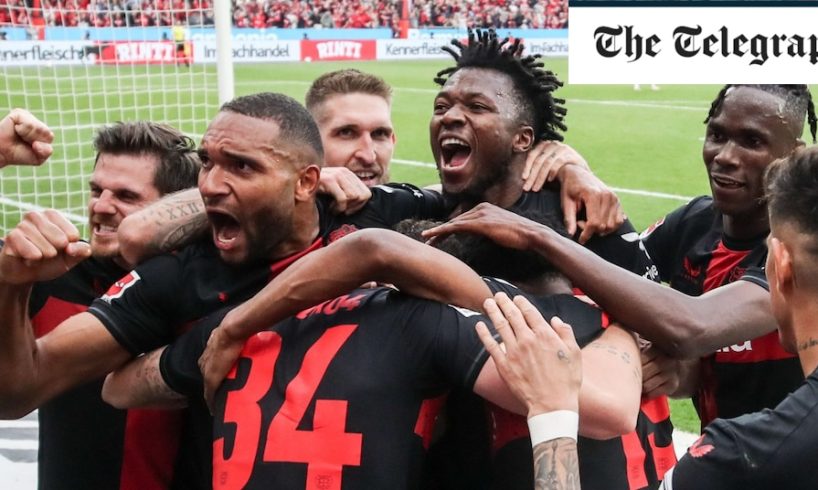
Bayer Leverkusen secured the 2024 Bundesliga title today with a 5-0 win over Werder Bremen, and a 29-game record of 25 wins, four draws and no defeats. Undefeated in all competitions over 38 games, a record points total is within their grasp over their last five games.
The Treble is also on: a place in the German Cup final awaits in May and they are one game away from the Europa League semi-finals. On Thursday they blew away West Ham in the first leg of the quarter-final.
Knocked off their perch are Bayern Munich – kings of the German game, with 11 consecutive titles and a wage bill three times that of Leverkusen. Xabi Alonso, Leverkusen’s manager of just 18 months, is the man of the moment. In October 2022, the club were 17th in the 18-team Bundesliga. Now, champions for the first time in their history, how did they get here so rapidly?
The gamble on Alonso
One of the greatest in the finest generation of Spanish midfielders, Alonso has coached a high-pass-volume, high-possession, rapid counter-press playing style redolent of late 2000s Barcelona. His transformation of a promising, well-constructed squad into one of Europe’s best sides has been one of the greatest managerial upgrades in years. Yet 18 months ago he still felt like a risk for Leverkusen, with five points from eight games.
Alonso had some success with the B-team of his hometown club Real Sociedad, gaining a promotion to the second tier in 2021, followed by a relegation the next season. In the meantime Leverkusen’s hierarchy wanted to make a change. By October 2022, the momentum that had earned Champions League qualification in the previous season had fizzled out. The club wanted to play a high-possession game. Alonso was a promising candidate, and had resigned from Sociedad B in the summer. He had status in the game and the club liked the idea of a young manager so technically adept that he could demonstrate to players on the training ground how it should be done. The big question: was he ready for a Bundesliga relegation battle?
The tight-knit executive
The club is run by a small circle of executives: sporting director Simon Rolfes; head of recruitment Kim Falkenberg; chief executive Fernando Carro, a Spanish national; and with oversight from chairman Werner Wenning. The latter is a major figure from German industry and former chief executive of Bayer AG, the pharmaceutical giant from which the club sprung as a works team 120 years ago.
Rolfes was a Germany international and had ten years as a Leverkusen central defender, around the period Alonso was at the peak of his powers as a player. Falkenberg was a successful Leverkusen academy graduate who also played as a centre-back, albeit in Germany’s second tier before quitting in his late twenties to rejoin Leverkusen in recruitment. He finally rose to the top of that department when Tim Steidten left to become West Ham technical director last summer. Rolfes appointed Falkenberg as his replacement. It had been Rolfes’ final call to appoint Alonso the previous October.
Between Alonso, Rolfes and Falkenberg they have built an astonishing side of overachievers on a wage bill roughly a third the value of Bayern’s.
Leverkusen’s status as a GmbH – a limited company – means that its finances are harder to penetrate than those of the member-owned clubs. Revenue is understood to top out at around €270 million depending on European qualification although Leverkusen does not feature in Deloitte’s audit of club revenues. Leverkusen’s wage bill is understood to be the fourth highest in the Bundesliga, around €143 million, behind the big two in Germany as well as just below that of RB Leipzig. It is the gap to Bayern that is the most striking.
By way of comparison Bayern are ranked sixth in the world by annual revenue this year by Deloitte, on €744 million. As for the Bayern wage bill, it is thought to be around €348 million. Borussia Dortmund are 12th on an annual revenue of €420 million and a wage bill of €231 million.
Bayer AG’s support of the club that bears its name is thought to be as much, sometimes, as €25 million a year, although it can fall according to requirements. Carro is one of the few German football executives against the 50+1 convention. “We’re not in an isolated world,” he told the FT recently, “imposing something like this via regulation is no longer valid.”
Rolfes and Falkenberg lead all football operations while Carro oversees the business. When it works well, it means that decisions can be made swiftly among a small collaborative group – and since October 2022 it has worked very well indeed.
A change in transfer tactics
Leverkusen have always been a selling club, and that did not change after Alonso led the team to the Europa League semi-finals last season, in an all-round revival that saw them finish sixth in the Bundesliga, 21 points behind champions Bayern. Moussa Diaby was sold to Aston Villa for £52 million, just as before him Bernd Leno, Kai Havertz and Leon Bailey had all been profitable Premier League sales. Leverkusen had always invested shrewdly in young players likely to develop into big sales. This summer Rolfes and Falkenberg tweaked the model.
Experience was judged to be what the team required. From Arsenal came the Swiss midfield warrior Granit Xhaka, now 31, a big €25 million investment with no resale prospect and weekly wages of around €110,000. So too Jonas Hofmann, for whom, at the age of 31, Leverkusen paid a €10 million fee. The Spanish wing-back Alex Grimaldo, 28, was a free agent commanding big wages by Leverkusen standards. All have been fundamental to the success of the season.
Young players from emerging leagues
Rolfes and Falkenberg run big scouting departments with specialisms in certain markets. Their South America scout Dieter Schreiber previously ran Adidas’ portfolio of elite endorsees in that region. Falkenberg recruited Brighton and Hove Albion’s academy scouting manager Matthew Green to oversee senior recruitment in emerging markets, like Sweden, Belgium and the Football League’s Championship. The club persuaded Southampton’s Nathan Tella, a Stevenage boy who has opted to play for Nigeria through family heritage, to turn down a Premier League season at Burnley. He was a key loanee there in the club’s promotion season but decided to come to Leverkusen instead.
At 24, Tella was one of those whose potential was being considered by many clubs. Leverkusen were able to sell him the possibility of Europa League and now Champions League football as a career springboard. The same was the case for Victor Boniface, another big investment at €20 million from Bodø/Glimt in Norway. After the sale of Diaby, Leverkusen’s net spend was around €20 million. Bayern spent €110 million on Harry Kane alone. Bayern also loaned Leverkusen the Croatian defender Josip Stanisic, with an agreement he could even play against his parent club. Stanisic duly scored the first of Leverkusen’s goals in their 3-0 win over Bayern in February.
Now the challenge is to keep the staff together
The club had never previously won a major trophy. They were best known across Europe for the infamous “Neverkusen” season of 2001-2002 when the team came second in the Bundesliga and lost the Champions League final and the DFB-Pokal final. Alonso is staying and the club are in the lucrative new-format eight-game-group-stage Champions League next season. The pressure is on for Bayer to build on this season’s success. Will they still have to sell?
The two stars of the team are Germany international, Florian Wirtz, 20, the team’s highest earner on around €145,000 per week, and Holland winger Jeremie Frimpong, 23, formerly of Celtic. Wirtz was another bold move, signed as a teenager from local rivals FC Cologne. Frimpong, a Manchester City academy graduate who grew up in England, is the more likely candidate with a value as much as €50 million.
Rolfes and Falkenberg will be of interest in the Premier League and further afield. Still just 36, Falkenberg has been part of the club’s recruitment department since 2017, even while his lower league playing career was in its final stages. He was made head scout in 2019, working under Rolfes who had himself learned under previous sporting director, the moustachioed 1980s West German legend, Rudi Voller.
Steidten was there on the touchline of the Bayer Arena at the final whistle to shake Alonso’s hand after the home team’s dominance of the game eventually broke West Ham. An association with Europe’s golden team of 2023-2024 is valuable and those at the heart of this incredible success story – manager, players, execs – are likely to be sought-after. Out-performing budget is one thing, winning a shock title is another. But this Leverkusen team could now reach 93 points and finish the league season unbeaten. Even the mighty Bayern have never done that.






